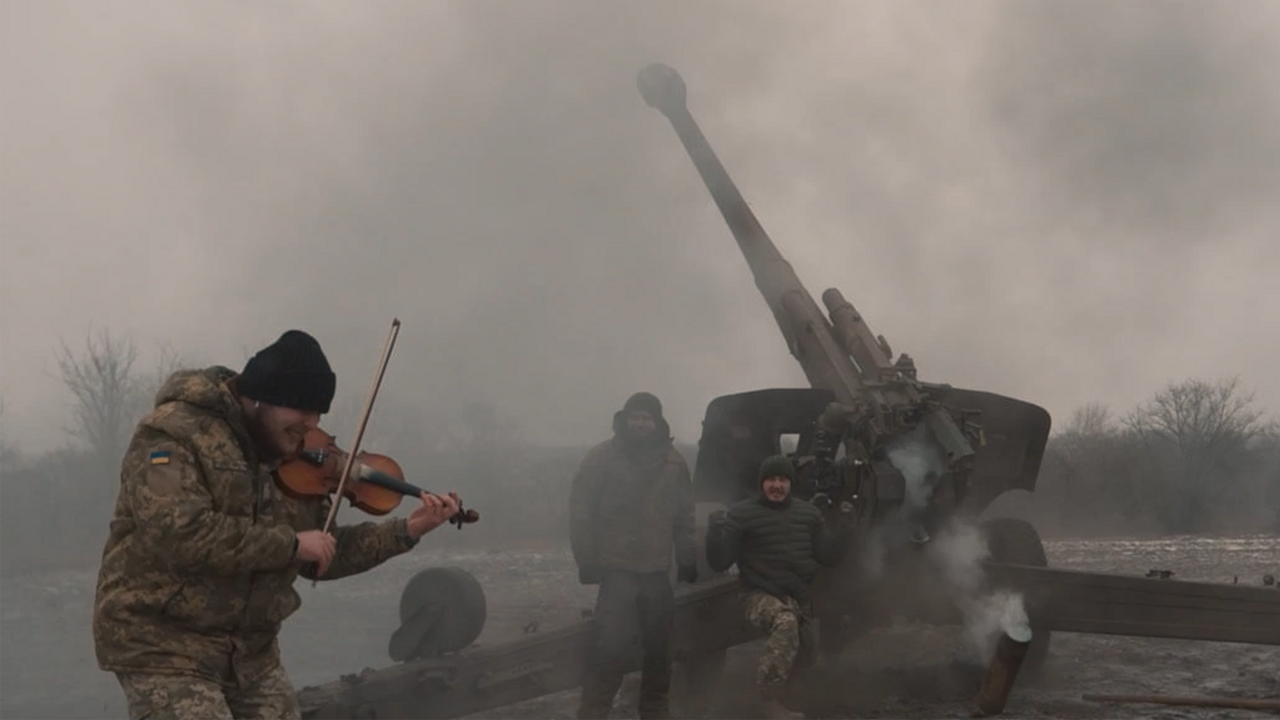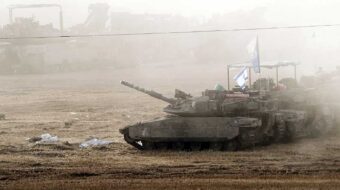
It’s hard not to be affected by Ryan Smith’s 2024 release, the feature-length documentary Soldiers of Song, which features Ukrainian musicians from concert orchestras and conductors to opera singers, rock bands, and Ukrainian folk ensembles, resisting Russian destruction from land and air. Smith includes many scenes of war, and war’s aftermath in cities and rural areas alike, and features many of the soldiers themselves, civilian volunteers who enlisted in any number of brigades separate from and independent of Ukraine’s formally trained military forces.
These musicians confront the Russian invasion both on and behind the battlefields with their art, creativity, and perseverance. The clear message is that ordinary Ukrainians, as well as the citizen soldiers themselves, appreciate this multi-sided support. As in most human struggles against adversities of many kinds, the moment opens itself up to a broad array of artistic response. People of almost any political persuasion might embrace the slogan “Art is a weapon,” though on that point, if I may digress, have you noticed how absent the arts and culture in general are from the Trump regime? Can you recall a single concert in the Trump White House, or any performer of renown appearing on his stage, or even the Don’s attendance at a play, an opera, or the Kennedy Center’s National Symphony Orchestra?
In short, these Ukrainian artists of a wide variety of genres have declared war on boorishness itself in order uplift the fighters’ spirits in resisting the Russians sent to war by Vladimir Putin. These performers, people such as Svetlana Tarabarova, Svyatoslav Vakarchuk, the band DakhaBrakha, Andrii Khlyvniuk, Kateryna Polishchuk (“Bird”), and the Mariupol Philharmonic, and lots more, raise their collective voices on behalf of their besieged nation. It was sweet to hear the Ukrainian national instrument, the beloved bandura, a kind of hand-held harp, played so movingly in several scenes.
As is well known, too, the arts communities in other countries have also risen up in support of Ukraine’s independence and sovereignty, with benefit concerts, star-studded fundraisers, and so forth.
In a Q&A following a recent showing at the University of Southern California, Ryan Smith explained that this film, shot mostly in 2023, arose in large part out of his previous work, the Emmy Award-winning NFL 360: Who If Not Us, about the somewhat improbable Ukrainian League of American Football. That documentary tracked a handful of American-style football players who responded to the Russian attack by selflessly volunteering to join the military defense of their country. Some of the people he met during that course of that project led directly into focusing on the musical arts in support of the armed forces both from the outside and from within the military ranks.
One after another, with little attention paid to through-line or storytelling in depth, those interviewed on-screen recount the episodic horrors and tragedies inflicted on them, their families, and communities. The jumping screen is filled with atrocities and destruction, including an aerial shot of the gutted Mariupol Theatre where hundreds of civilians lost their lives when a Russian bomb struck right in the center of the orchestra section. A common recurring theme in this “all-people’s war” film is how resilient people are despite it all—how they continue to find beauty in life, find love, and start new families. No holds are barred in the film’s appeal for your sympathy.
But I have questions
As the minutes passed, though, I started asking myself some questions. I wondered, first of all, if Ukrainian President Volodymyr Zelensky (and his wife) are such a constant presence in the Western media as the cherished global voice of Ukraine, how come—unless possibly I missed it amidst the din of war—no one mentioned his name, his leadership, his own personal heroism? (Possibly because he’s Jewish? Brought up Russian-speaking? Because he canceled the 2024 presidential election to stay in power?)
Why was the Schubert “Ave Maria” featured so prominently in this film—sung by an operatic tenor, and again by a boys’ choir? Does Smith’s film show a bias toward the more Western-oriented Ukrainian Catholics, who are so distinct from the Ukrainian Orthodox tradition that has more in common with Russian Orthodoxy?
With all the calls for a fight to the end, however long and hard the ordeal, does anyone in Ukraine give a thought to how the road to war was paved? To U.S. intervention in presidential elections and the ouster of a president committed to peaceful relations with both the Russians and the West? Did anyone think about losing the income Ukraine received from Russian oil and gas transport through Ukraine to the West? Did no one stop to think how provocative the notion of Ukraine joining NATO might be to the Russians, to have nuclear weapons parked on its very borders? Does no one acknowledge that passing a law restricting the use of the Russian language might alienate Ukraine’s millions of native Russian speakers, especially in the eastern regions abutting Russian territory, and perhaps make them lean toward separation from Kiev?
And if there is only one common, universal feeling of resistance to Russia at whatever ultimate cost in life and treasure, could it be that we just don’t hear other voices from the banned labor movement and opposition parties and press?
Could it possibly be that certain forces in the West—perhaps best capsulized in the phrase coined by Dwight D. Eisenhower, “the military-industrial complex”—keep pushing the war for the sake of billions of dollars’ worth of war materiel they’re throwing against Russia? And that just conceivably, the war may be a proxy war, at the cost of Ukrainian lives, in the larger strategy to bankrupt Russia back into the league of second-rate, non-threatening countries, leaving Washington free to focus its attention on China’s rise to prominence?
Does a viewer make anything of the fact that the documentary is funded by the Governor George Pataki Leadership Center, which released the film on VOD. The Governor George Pataki Center has taken a forward role in supporting Ukraine in any number of ways.
In short, Soldiers of Song amounts to a plea for support for continued funding and fighting the war until victory. The only option is the total defeat of the Russians, whatever the price. Since conflicts usually end in some kind of peace treaty, could that not have been reached sooner rather than later? In our Realpolitik world, it is only realistic to posit that Ukraine’s future must inevitably take into consideration Russia’s fears of yet another invasion from the West and that country’s resolve not to have an enemy sharing a long border with it. How different is that from the U.S. not wishing to have Canada or Mexico aligning with one of America’s global competitors?
If you’re solidly, uncritically on Ukraine’s “side” in this war, and brook no alternative resolution than the total, humiliating defeat of Russia, then this might be the film for you. If, like me, you are prone to asking impertinent questions, then keep them in mind if and as you watch. (The trailer can be viewed here.)
We hope you appreciated this article. At People’s World, we believe news and information should be free and accessible to all, but we need your help. Our journalism is free of corporate influence and paywalls because we are totally reader-supported. Only you, our readers and supporters, make this possible. If you enjoy reading People’s World and the stories we bring you, please support our work by donating or becoming a monthly sustainer today. Thank you!











